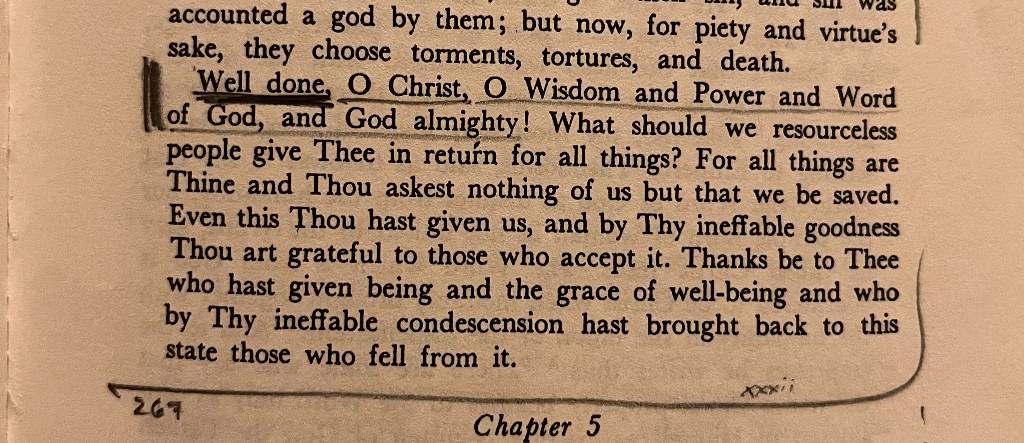Well done, O Christ!
Praying with St. John of Damascus
St. John of Damascus published a book called The Fount of Knowledge in about 750 A.D. It is the crown of the early Fathers, summing up the exposition and teaching in the centuries after Christ’s first coming, the time of the Ecumenical Councils.
The book has three parts: on philosophy, on heresy, and on the Orthodox faith. The third part sets forth the two great dogmas of the Church—the Trinity and the Incarnation—and then walks through our fall and redemption, and the flowering of the Church.
The crescendo of the third part is a stunning declaration of the victory of Christ within our one shared human history and civilization. The Gospel has been preached, idols have been torn down, virtue has been established, and not through force of arms but by the persuasiveness of unlettered fishermen. The Damascene writes near Jerusalem while the Holy Land is under the yoke of Islam, and while the Church is infested with iconoclasm. Yet he can still celebrate the reality of Christ’s impact. He bursts into prayer!
This prayer—the only prayer in the entire Fount of Knowledge—is the crown of the crown of the crown of the crown of the crown of the early Fathers.
This is our effusive response to Christ’s real victory in our actual world, the pinnacle of Faith reached by ascending from the assessment of all true philosophy through the refutation of all heresy. This ascent is compiled, collated, and filtered from all of the earliest Church Fathers from the Apostles down to the eve of the Seventh Ecumenical Council, by our father among the saints John of Damascus. In that Council he contributed materially (from glory) to the eventual Triumph of Orthodoxy. The Kingdom of God is not yet, yet it is already, in our material world, in our midst.
How strange, though, for us to address Christ with, “Well done!” It can seem inappropriate, as if we were setting ourselves up as a judge over Christ–God forbid! No: this can only be understood as a response to the, “Well done, good and faithful servant!” that we all long to hear. Indeed, the Greek term (εὖγε) is the same in both instances.
Another of the wonders of this prayer is its laying bare of two parodoxical realities: God’s Grace and our free will. We are “resourceless.” We are dependent on Christ for “all things,” including our very “being and the grace of well-being.” Even what Christ asks of us, the one and only thing—”that we be saved”—He gives us. The only thing that lies with us is whether we “accept” His gift. Our initial conversion, and each subsequent moment of repentance and return, is in our hands. Yet every moment leading up to our moments of repentance, and every moment leading forth, are Christ’s. Our repentence is almost, we might say, a single point, without dimension or content. Christ is wholly active in bringing us to salvation, and wholly active in carrying us forward from it. Our bare, stark acceptance is all that is in our hands—simultaneously everything for us, and yet so close to nothing.
How shocking to learn that Christ is grateful when we accept His salvation! Perhaps the parable of the Prodigal Son gives us a way to comprehend the Damascene’s spiritual insight. The Father declares, “It is right that we should make merry and be glad.” In the mystery of God’s providence, He never forces us to accept His salvation. Yet we know that there is joy in the presence of the angels of God over one sinner who repents. From the Damascene we learn that Christ Himself shares in—indeed, is the Alpha and the Omega of—this joy, this gratitude.
O Christ our God, lead us to repentance. Give us Grace to accept. Smash the idols in our life, in our households and neighborhoods, our cities and nations! St. John of Damascus, pray for us!
Praying with St. John
Surely this prayer is suitable to include in one’s private devotions. How else might it be incorporated into the life of the Church?
A Note on Translations
The standard translation of The Fount of Knowledge has been
Chase’s, and this is the
version quoted above (p. 339). SVS Press has published a new
translation,
but its rendering of the prayer is not as poetic. 